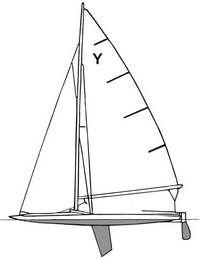Engineering:Y flyer
 Class symbol | |
 | |
| Development | |
|---|---|
| Designer | Alvin Youngquist |
| Location | White Lake Yaught Club Michagen |
| Year | 1938 |
| Boat | |
| Crew | 2 |
| Draft | 1.219 m (4 ft 0 in) |
| Trapeze | None |
| Hull | |
| Type | Monohull |
| Construction | Wood; Fiberglass |
| Hull weight | 226.7 kg (500 lb) |
| LOA | 5.486 m (18 ft 0 in) |
| Beam | 1.767 m (5 ft 9.6 in) |
| Hull appendages | |
| Keel/board type | 4 feet - retractable rear-swing centerboard |
| Rig | |
| Rig type | Marconi |
| Sails | |
| Spinnaker area | 51.15 m2 (550.6 sq ft) |
| Upwind sail area | 14.9 m2 (160 sq ft) |
| Racing | |
| PHRF | 86.5 Portsmouth |
The Y Flyer is an 18-foot (5.5m) sloop-rigged racing dinghy designed to be sailed by 2 people. Although the boat looks and performs like a scow, the bottom of the hull is not quite flat, but split along the centerline into two flat chines. Y-flyers are built of either wood or fiberglass. The Y Flyer was designed in 1938 by Alvin Youngquist, a Naval Architect working in Toledo Ohio, who wished to build a two-person performance dinghy as a training boat for the larger A-Scow. He published the design in Rudder magazine with instructions for how to build it at home using marine plywood. Many Y Flyers are built by their owners following the class rules and design which remain little changed since 1938. Several commercial boat builders have also built Y-Flyers, including Hinterhoeller Yachts and Turner Marine, who are the only builder commercially offering the design today.
The Y Flyer is an active one-design class with fleets, sailing clubs and regattas primarily in the US Southeast, US Upper Midwest and Eastern Canada. The class is designated by a "Y" on the mainsail. Approximately 3000 Y-Flyers have been registered to the class associations.
The Y Flyer class requires boats to weigh at least 500 pounds fully rigged, without crew or sails, and to carry class-approved upwind sails measuring 161 sq ft (14.9 m2). The Canadian Y-Flyer class allows for a spinnaker to be used downwind. The American Y-Flyer class rules forbid the use of spinnakers. When racing against non-class sailboats, the Y-Flyer uses a Portsmouth Yardstick rating of 86.5. The boat sailing characteristics are similar to other fast planing performance boats, but the Y Flyer is notable for having a bluntly squared-off fore-deck and using a whisker pole nearly half the length of the boat when setting the jib for running downwind.
The American Y-Flyer class has 19 active one-design fleets and supports a travelling regatta series including Midwinter Races and multi-regatta Mid-Western Cup and Helmsman Cup Awards. The class is noted for maintaining rules which minimize the advantages of high-tech, high-cost features. This focus allows sailors with a modest budget to remain highly competitive. Each year many older boats, with low sail numbers, place well in races at the club and regatta level.
External links
- One Design Racing Summary Page - Y-Flyer
- American Y-Flyer Class Page
- Chippewa Yacht Club - One of the many active fleets and host of Midsummer Madness Regatta
- Canadian Y-Flyer Class Page
- Google Map of Active Y-Flyer Fleets and Regattas
- Sailing Anarchy Y-Flyer Discussion
- Turner Marine Y-Flyer Photo Gallery

